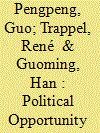| Srl | Item |
| 1 |
ID:
141093


|
|
|
|
|
| Summary/Abstract |
In recent years, the Chinese central state has launched the “new socialist countryside” campaign (NSCC), which authorizes the local state expropriation of rural land from farmers, and then incorporates evicted farmers into township residence and urban citizenship. In affected regions, this campaign enables local state officials to enact practices of bureaucratic absorption that undermine potential resistance by bringing resisters into formal channels of bargaining through both juridical and ideological means. Based on ethnographic data from Sichuan province, this article reveals an in situ process of bureaucratic absorption in “Lan-ding village,” where the incorporation of rural residents into urban citizenship enables the depoliticization of resistance to land expropriation, first by changing the citizenship-based grounds on which legitimate claims to land can be made, then by discursively reframing eviction as a normative shift towards modern wage dependence.
|
|
|
|
|
|
|
|
|
|
|
|
|
|
|
|
| 2 |
ID:
145790


|
|
|
|
|
| Summary/Abstract |
Peasants’ use of existing legal and political resources to right wrongs done to them and the law as a narrative frame to assert their claims in protests have been well captured in the concept of “rightful resistance.” The image of a “restive citizenry” by which peasants—as rightful resisters—struggle valiantly to defend their own rights, however, has been increasingly questioned by scholars who find either that the wronged peasants do not get angrier or that their rightful resistance is eventually muted. The present article examines dozens of inland-provincial peasant-coal miners who suffer from mining-induced pneumoconiosis. It is also found that the victims express an unwillingness to pursue their rights through the courts or enact rightful resistance if the courts or other formal institutions fall short in delivering the promised rights. In examining how peasant-coal miners consider what is the “best way” to obtain compensation, this article suggests that they could be said to be a “compromising citizenry” through which they recognize the law and formal procedures as legitimate but at the same time consider bribing state officials as a prerequisite to protect their legal rights.
|
|
|
|
|
|
|
|
|
|
|
|
|
|
|
|
| 3 |
ID:
190410


|
|
|
|
|
| Summary/Abstract |
Using a detailed case study of house eviction in peri-urban China as well as original data from an online survey experiment, this article explores the opportunistic bargaining phenomenon in China in which citizens leverage the policy priorities of authorities with tactics that are not approved by the state to bargain for goals beyond those promised by the state. We find that opportunistic bargaining is widely accepted by Chinese citizens and that such an inclination is encouraged by successful precedents and clear signals of an opening through which to leverage government policy priorities; however, it is dampened by unclear signals and failed precedents. We also find that opportunistic bargainers tend to hold more negative perceptions of the current regime and are less likely to abide by state rules or social norms. The characteristics of opportunistic bargaining appear to be the opposite of the dominant “rightful resistance” framework.
|
|
|
|
|
|
|
|
|
|
|
|
|
|
|
|
| 4 |
ID:
179946


|
|
|
|
|
| Summary/Abstract |
How does "rightful resistance" take place in contemporary rural China? The continuously evolving village election system, the abolishment of the agricultural tax, and a new insistence on fighting corruption seemingly have created more space for the rural population in China to defend its rights. However, the central state's emphasis on solving the so-called three rural issues (sannong wenti 三农 问题)—raising incomes and welfare for the rural population, modernizing the countryside, and developing industrialized and modern agriculture—in a topdown manner and the continued use of "project-based management" have also greatly decreased the ability of the rural population to influence the agenda of the state and have thereby increased the potential for friction between the local state and its rural citizens. This article is a case study of a dispute between villagers and local cadres about the implementation of a reforestation project. While the case shows that villagers have several avenues for protest, it also hints at the low effectiveness of their protest and the continued existence of important structural obstacles dealing with different levels of the administration, including the atomization of villagers, the volatile nature of their interest coalition, and a profound lack of allies in society.
|
|
|
|
|
|
|
|
|
|
|
|
|
|
|
|